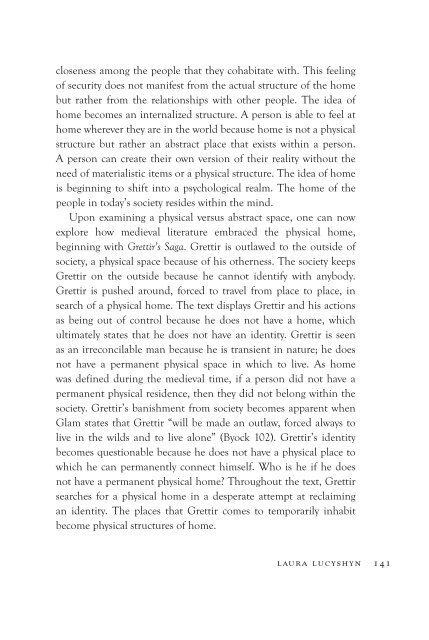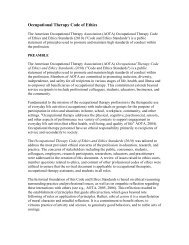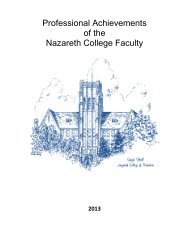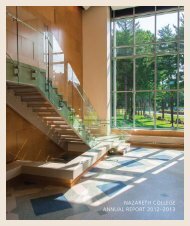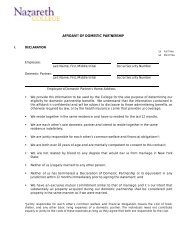Afternoon of Alterity - Nazareth College
Afternoon of Alterity - Nazareth College
Afternoon of Alterity - Nazareth College
Create successful ePaper yourself
Turn your PDF publications into a flip-book with our unique Google optimized e-Paper software.
closeness among the people that they cohabitate with. This feeling<strong>of</strong> security does not manifest from the actual structure <strong>of</strong> the homebut rather from the relationships with other people. The idea <strong>of</strong>home becomes an internalized structure. A person is able to feel athome wherever they are in the world because home is not a physicalstructure but rather an abstract place that exists within a person.A person can create their own version <strong>of</strong> their reality without theneed <strong>of</strong> materialistic items or a physical structure. The idea <strong>of</strong> homeis beginning to shift into a psychological realm. The home <strong>of</strong> thepeople in today’s society resides within the mind.Upon examining a physical versus abstract space, one can nowexplore how medieval literature embraced the physical home,beginning with Grettir’s Saga. Grettir is outlawed to the outside <strong>of</strong>society, a physical space because <strong>of</strong> his otherness. The society keepsGrettir on the outside because he cannot identify with anybody.Grettir is pushed around, forced to travel from place to place, insearch <strong>of</strong> a physical home. The text displays Grettir and his actionsas being out <strong>of</strong> control because he does not have a home, whichultimately states that he does not have an identity. Grettir is seenas an irreconcilable man because he is transient in nature; he doesnot have a permanent physical space in which to live. As homewas defined during the medieval time, if a person did not have apermanent physical residence, then they did not belong within thesociety. Grettir’s banishment from society becomes apparent whenGlam states that Grettir “will be made an outlaw, forced always tolive in the wilds and to live alone” (Byock 102). Grettir’s identitybecomes questionable because he does not have a physical place towhich he can permanently connect himself. Who is he if he doesnot have a permanent physical home? Throughout the text, Grettirsearches for a physical home in a desperate attempt at reclaimingan identity. The places that Grettir comes to temporarily inhabitbecome physical structures <strong>of</strong> home.laura lucyshyn 141


